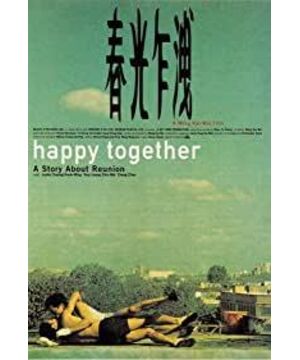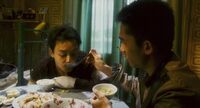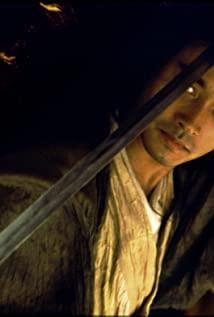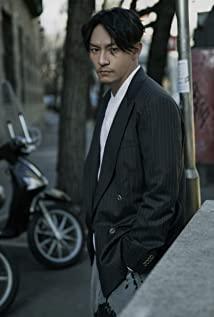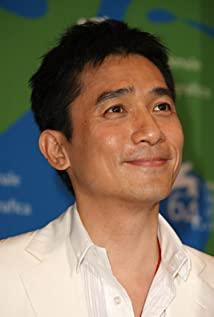Compared to Ang Lee's "Broken Arm Mountain," "Breakthrough" is more daring, more trivial, and more realistic. The film indulges in trivial and gloomy life fragments, does not explain the background of the characters, does not explain the origin of the relationship between the characters, but only uses an artistic lens to scan the ambiguous life between the two men: they smoke together. , eat together, dance together, and there are constant disputes and quarrels between them. The distance between the characters is also restricted by the rhythm of the film, and the final ending is full of imagination. In the refusal of the past and the search for belonging, the character is no longer the subject of events and life, but a symbol of an uncertain emotion. In 2005, Ang Lee won the Oscar again with the gay-themed "Broken Arm Mountain"; eight years ago, Wong Kar-wai also made his name in Cannes, France, with a film of the same theme, "Breakthrough". The two Chinese-language film directors made us proud and excited at different times. The difference is that Ang Lee's Brokeback Mountain emphasizes "love"--even the constancy, longevity and unforgettable life of same-sex love; while Wong Kar-wai's "Breakthrough" shows the fragility and short-term nature of this abnormal love. Connected with the broken wire. But having said that, Wong Kar-wai is better at doing business than Ang Lee, and even the title of the film is so glamorous. "Lei Yaohui, why don't we start over." At the beginning of the movie "Breakthrough", in black and white light and shadow, in a small hotel room in Argentina, He Baorong, who was lying on the bed, told Li Yaohui. "Start over" - what a warm and seductive phrase that everyone who has seen the film - especially those who have had an on-again-off-again relationship with a lover - will surely remember it. Still new. These simple words seem to have a kind of magic power. Whether it is a lover who has broken up or is about to break up, as long as they still have affection for the other party, once these words are heard, they will inevitably be somewhat inexplicably moved... It seems that as long as they are willing to Nodding, then all the old grudges, love, hatred and infatuation can all be written off, and they both return to the origin of their emotions. Life seems to be the same as before, but they can hold hands again and restore the old friendship... "Breakthrough" tells the story of a gay couple, He Baorong and Lai Yaohui. The film breaks through the prejudice or negative rendering of ordinary films of the same theme, and examines two men in love from an honest perspective. More life-like dialogue designs and plot arrangements depict secular characters' emotions. Wong Kar-wai handled the emotional entanglements, joys and sorrows between the two men just right and touched people's hearts. Under his lens, homosexual love is no different from ordinary heterosexual love. It is sweet, noisy, on and off. The same ups and downs, the same joys and sorrows. The plot of two big men in the two-person world of Buenos Aires is angry, bickering, quarrelling, and jealous about the trivial matters of life, which almost makes people forget that the love here is homosexuality. "Happy Together" is nothing more than a semi-popular alternative film genre of homosexuality to narrate the feelings themselves. Love is easy to get along with, but many times, two people who clearly love each other are ruthlessly and firmly confronted, enduring partings and losses again and again. Forces are reciprocal, causing another person to suffer while also suffering emotionally tormented pain. Lai Yaohui (Leung Chiu Wai) and He Baorong (Leslie Cheung) went to Argentina in search of the waterfall on the lampshade. Every time they broke up, it was because of He's restlessness, and every time they got back together, it was because Li had no immunity to He's "it's better to start over". Although the two love each other deeply, their outlook on life is very different. He is unruly, unwilling to be bound by the world of two. But Li dreamed of a life of mutual support. He was happiest when he was injured. Even if he had a high fever and wrapped a blanket while cooking for He, he was happy. In order to stay with He completely, he hid He's passport so that He could no longer wander around. Their relationship fell into a vicious cycle of "it's better to start over" over and over again. "It's better to start over" is nothing but a mirror image, just like they once searched for an unsuccessful waterfall together, and got lost in the process of searching. Against the backdrop of emotionally charged Latin music throughout, it tells a story of loss in pursuit. Before leaving Buenos Aires, Li Yaohui drove to the waterfall alone, "I always think that there should be a couple standing here." At this time, He Baorong was in Li's apartment, crying bitterly while hugging the blanket he covered. . He knew that Li Yaohui would never come back. Lost past, confused future. Ideals and hopes are deconstructed to pieces by reality. He Baorong's repentance came too late. He finally made up his mind to repent after squandering every opportunity, but the wings of the god of opportunity were already crushed by the stacked disappointment. They will never go back. When happiness is so close at hand, we can't always see what it is. Do not know how to cherish, can not choose. Only when it left, did we touch the heartache and realize it. Li Shangyin once said in a poem: "This feeling can be recollected, but it was lost at that time" (Tang·Li Shangyin "Jinse"). People in love must love each other well and cherish the rare fate. Because no one will wait for you to come back when you have the heart and heart to leave. Years can't afford to wait too long, or empathy because of loneliness and intolerance, or give up because of discouragement in love, all kinds of reasons, all kinds of changes, time is the biggest enemy of love. Not all stories can be restarted when you want to. When you know how to cherish and come back later, maybe love has gone through vicissitudes. In life, there is always something that will never come again and cannot be repeated. In front of the splashing waterfall, Li Yaohui also burst into tears, and the beautiful dream hidden in his heart was smashed into pieces in his life. Happiness is always smiling and beckoning in the distance, and trials are always in waves. He didn't dare to return He Baorong's passport, he was afraid of hearing the phrase "it's better to start over" that made him hopeless and desperate. Most of the characters in Wong Kar Wai's films are indifferent on the surface, but they are often fragile and emotionally sensitive inside. Li Yaohui, who has been emotionally trapped for many times, always seems to be indifferent. It was not until the last cry on the tape and the tears in front of the waterfall that his wounded heart was exposed and his inner world was revealed. As Xiao Zhang said in the film, "A lot of things are better to hear with ears than to see with eyes. It seems that a person pretends to be happy...but the sound can't pretend. Listen carefully and you will know." What you see is often not true, what you hear is often not true It's hard to hide. Perhaps this is why Wong Kar-wai has a soft spot for voiceover monologues. The speaker was calm, and the listener felt a little pain in his heart. Those tremblings from the soul are like a small hammer, brutally smashing the outer shell of the urbanites everywhere, exposing the fear and desire inside. It was so fragile. It was so unbearable. This is us, fear of love, fear of rejection, fear of hurt, fear of ourselves. Compared with He Baorong, Li Yaohui's role is relatively traditional and conservative, and he is affectionate, righteous and responsible. He Baorong made a simple phone call, and he would follow him; He Baorong gave him a watch, but he didn't want it, but later he put the watch that had been thrown on the ground in his arms; after He Baorong was injured, he not only let him Lived in his own room, and took care of his daily life meticulously, feeding him meals, helping him wipe his body, buying him cigarettes, accompany him in morning exercises, even helping him cook when he had a high fever, and later even more Lost his job to avenge him. He Baorong, on the other hand, is unruly and willful by nature. Many times, he completely ignores Li Yaohui's feelings, and he comes and leaves whenever he wants. Once the two are compared, the role of Li Yaohui is obviously more pleasing, perhaps because of this reason, plus Tony Leung's performance is indeed a three-pointed piece, which is remarkable, so he later won the Hong Kong Film Golden Statue with this film. Best Actor Award. Although He Baorong is indeed not as likable as Li Yaohui in character and behavior, although Li Yaohui has always been tolerant, forbearance, and dedication, He Baorong blindly went his own way and acted recklessly, and basically did nothing for Li Yaohui. But in terms of emotional contribution, He Baorong's contribution may not be less than that of Li Yaohui, but his expression is different from the latter. For example, the watch he gave to Li Yaohui, although he asked for it later, was a way for him to be beaten and bruised. In that era of awakened personality and confused mentality, since their love is not for fertility, nor for family, nor for money, then emotion and sex have naturally become the most important touchstones to witness love. The opening paragraph of the movie was considered a shocking passion scene at the time. At least it can be explained that sex is not the main reason for the two to break up and combine, so the key to the problem is the relationship. In that marginal city, under that special background, human nature is actually quite pale and fragile, and everyone is extremely afraid of loneliness. And He Baorong's way of dispelling loneliness is to show his attitude and behavior towards Li Yaohui's willfulness, obsession, and constantly fleeing from Li Yaohui's side, even hurting Li Yaohui's feelings, so as to cover up his own desire for warmth but fear of being hurt. Psychological; and Li Yaohui's repeated efforts and tolerance seem to be great, but in the final analysis, it is just because of loneliness. "I really want you to accompany me..." This is not only He Baorong's voice, but also a true portrayal of Li Yaohui's subtle mentality. The difference between them is that the former has always held the initiative to break up and reunite, and he saw that "let's start over" is the death point of the latter, so he was somewhat confident, thinking that even if he broke up, as long as he As soon as this trick comes out, they can "start again"; while the latter thinks that as long as the former stays by his side, so that he can take care of him, it will be his happiest day. "I have never told He Baorong about some things. I don't want him to recover too soon. The days when he was injured were the happiest for me and him."... And these are precisely the important reasons that led to the final breakup of the two! He Baorong never dreamed that his trump card would fail one day; and after Li Yaohui left with He Baorong, he finally walked into a movie theater casually and hung out with a Western man in the dark. So he finally understood: "I always thought that I was different from He Baorong. It turned out that when I was lonely, all people were the same." All people were the same. After he figured it out, Li Yaohui took out He Baorong's passport, left Buenos Aires resolutely, and went to see the waterfall that once made him and He Baorong linger. "I finally came to the waterfall, I suddenly thought of He Baorong, I felt so sad, I always thought that there should be a couple standing here." He never forgets the old feelings, but this time, he has really decided to let go. As for He Baorong, he rented the apartment where Li Yaohui once lived, and packed everything neatly, including the cigarettes Li bought back, and even repaired the table lamp with the waterfall painted on it. From time to time he opened the door, eagerly awaiting the return of his lover, expecting to "start over" again. It's a pity that good luck made people, and now he is willing to turn back, but Li Yaohui has long gone and disappeared into the sea of people. Life is so cruel sometimes. For so many years, I closed my eyes in ecstasy, and when I decided to open my eyes, I saw such a bloody landscape. The night is as cool as water, and the amazing spring light is quietly lonely in Buenos Aires. Although it was like a fireworks, it only opened for a moment... At that moment, we seemed to see the scene of Li Yaohui and He Baorong dancing together in that small kitchen. At that moment, our memory spanned the galaxy of time, like fragments of stars scattered on both ends of the map; and at that moment, we seemed to hear the seductive words again: "Li Yaohui, why don't we start over? ." Compared with Ang Lee's "Broken Arm Mountain," "Breakthrough" is bolder, more trivial, and more realistic. The film indulges in trivial and gloomy life fragments, does not explain the background of the characters, does not explain the origin of how the characters started this relationship, but only uses an artistic lens to scan the ambiguous life between two men: they smoke together, eat together, and together Dancing, there are constant disputes and quarrels, the distance between the characters is also restricted by the rhythm of the film, and the final ending is full of imagination. In the rejection of the past and the search for belonging, the characters are no longer the subject of events and life, but the symbol of an uncertain emotion. It does not link too many metaphysical judgments such as value and meaning, but only a large piece of inner freehand controlled by the expressive power of the lens. On the eve of Hong Kong's "September 7th" return, Wong Kar-wai reached the top at Cannes with "Best of Love" - winning the Best Director Award. Therefore, many commentators have linked this film with the social, economic, and cultural conditions of Hong Kong at that time, and believed that Wong Kar-wai was using this film to express Hong Kong people's search for history, culture, and identity during the transitional period. I don't think so. I think for Wong Kar-wai, his social awareness seems to be less strong. All his attention. They are all in their own art world, which is to spend a lifetime telling stories about emotions, of course, including ambiguous.
View more about Happy Together reviews


